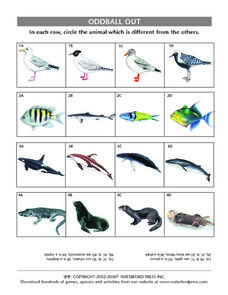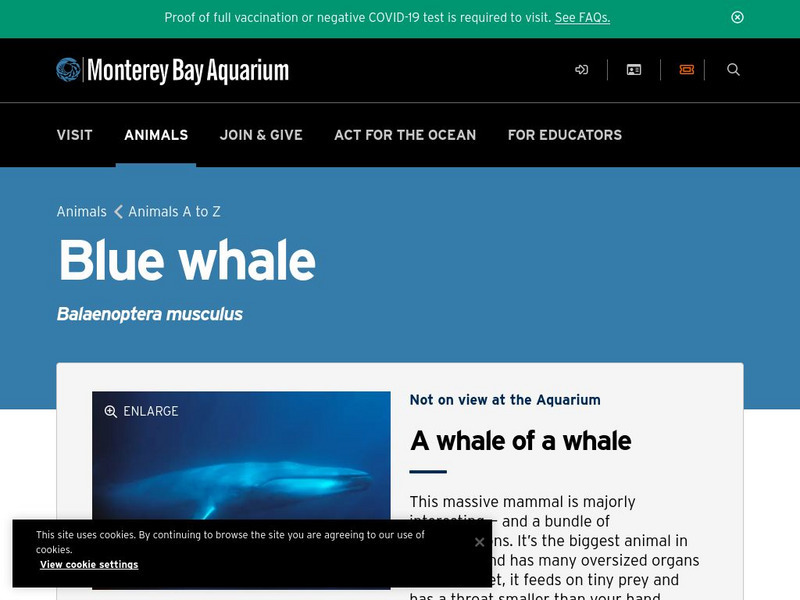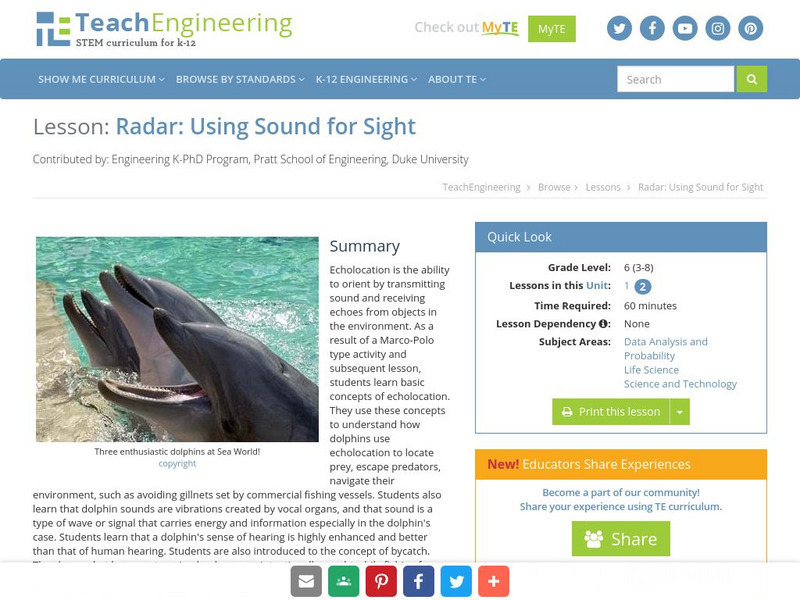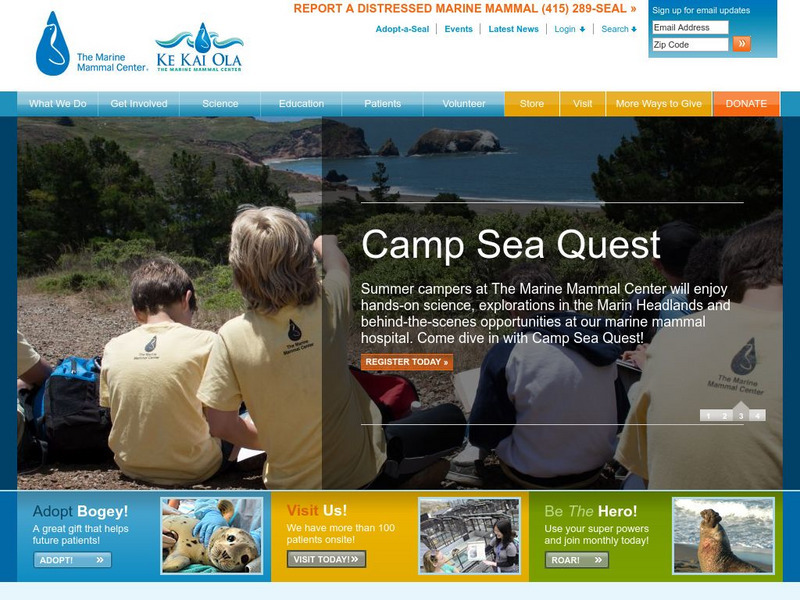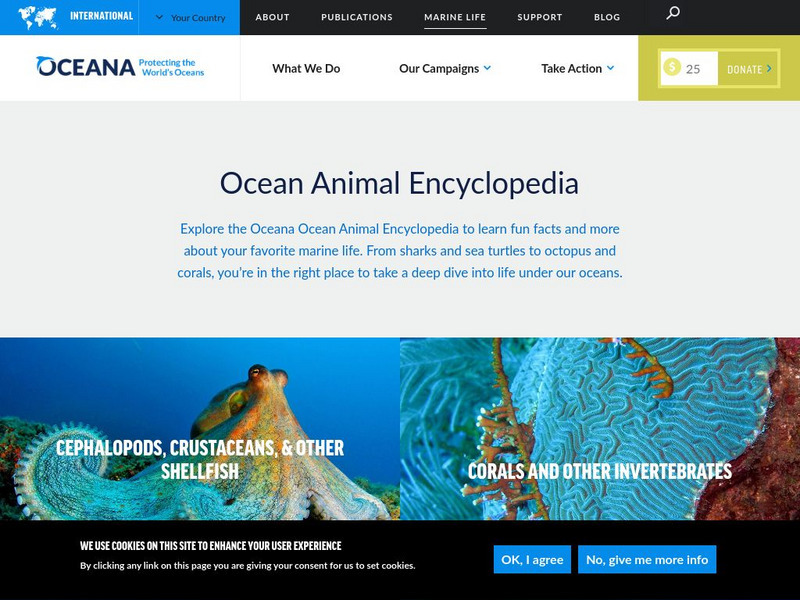Curated OER
The Sights and Sounds of Orcas
Students investigate the orca whale. They participate in an online Webquest, listen to whale vocalizations online, answer discussion questions, and locate and read newspaper articles on marine mammals and orca whales.
Curated OER
Oddball Out: Birds, Fishes, Marine Mammals
In this science worksheet, pupils analyze 4 animal pictures in a row. Students circle the animal which is different from the others. There are 4 rows of pictures. Answers are provided upside down at the bottom of the page.
Curated OER
Shadow Know-How: Marine Animals
In this fill in the blank worksheet, students identify the names of ten marine mammals by analyzing their outlines in shadow pictures.
Curated OER
Shadow Know-How
In this fill in the blank worksheet, students identify the names of ten different marine mammals by analyzing their outlines in shadow
pictures.
Curated OER
Easy Whales Crossword Puzzle
In this vocabulary worksheet, students examine facts about whales by solving a 6 clue crossword puzzle. Students also color the picture.
National Center for Ecological Analysis and Synthesis, University of California Santa Barbara
Kids Do Ecology: Marine Mammal Pages
Learn all about marine mammals at this fun site from the National Center for Ecological Analysis and Synthesis. Explore different species, learn about migration, gather and graph marine data, and more.
Tramline
Tramline, Inc.: Virtual Ocean Field Trip
In this enchanting site, students will learn basic principles about oceans and will be introduced to an assortment of sea life, both plant and animal. Other interesting ocean links can be found on the teacher resource section of this link.
Monterey Bay Aquarium
Monterey Bay Aquarium: Blue Whale (Balenoptera Musculus)
Resource that gives information on the diet, range, relatives of the blue whale. Conservation notes and cool facts are also included. There are links to similar information on dozens of other types of marine life.
TeachEngineering
Teach Engineering: Sound for Sight
Echolocation is the ability to orient by transmitting sound and receiving echoes from objects in the environment. As a result of a Marco-Polo type activity and subsequent lesson, students learn basic concepts of echolocation. They use...
Other
Mcsuk: Seas Fit for Life
In this thorough site, you will find lots of teacher resources including marine environmental issues.
Other
The Marine Mammal Center
Check out the research and current topics sections for ways that this rehabilitation center for marine mammals is using tracking methods to keep tabs on some of the patients they have released back into the wild.
San Diego Zoo Global
San Diego Zoo: Sea Lion
This resource provides detailed information about the sea lion, as well as several pictures and an audio clip. [1:34]
NOAA
Noaa: National Marine Fisheries Headquarters
This home page provides links to fisheries organizations, research and regulations.
American Museum of Natural History
American Museum of Natural History: Milstein Hall of Ocean Life
Tour the museum's famed exhibition hall dedicated to ocean life at this online recreation. Find videos, maps, species specimens, and images that let you experience many of the museum's resources on ocean life right from your desktop.
San Diego Zoo Global
San Diego Zoo: Manatee
This engaging resource from the San Diego Zoo provides extensive information on manatees including details about their habitat, physical characteristics, size, diet, family life, conservation status, and fun facts.
National Center for Ecological Analysis and Synthesis, University of California Santa Barbara
Kids Do Ecology: Marine Mammals
This resource provides information about marine mammals.
Texas Instruments
Texas Instruments: Jason: Can You Breathe Like a Pinniped?
From Shore to Sea: Pinnipeds are marine mammals that spend a great deal of time in the water. Like all marine mammals, pinnipeds breathe air through their lungs. In order to breathe, they must come up to the surface for air.
Texas Instruments
Texas Instruments: Jason: Pinniped Body Shape Conserving Warmth
From Shore to Sea: To survive in cold ocean environments an organism's body must be adapted to life under water. A body will cool very quickly when in contact with water. The body shape of an organism is one adaptation that helps to...
Society for Science and the Public
Science News for Students: Sleepless at Sea
Can you go for a month without sleeping? Most mammals can't, but scientists have found some marine mammals that do. Find out why some orcas and dolphins don't sleep for weeks at a time.
TED Talks
Ted: Ted Ed: Why Do Whales Sing?
Stephanie Sardelis decodes the evocative melodies composed by the world's largest mammals, whales. [5:12]
Other
Oceana: Marine Animal Encyclopedia
Learn about marine animals with this marien animal encyclopedia. Animals are arranged by species.
Sea World Parks & Entertainment
Sea World: Walrus
Walruses, members of the seal family of marine mammals, are profiled in detail with information about their classification, habitat, behaviors, and conservation. Other features include books for young readers.
Quia
Quia: Animal Facts Scavenger Hunt
At this website you are given ten questions to answer and links to three websites where you can find those answers.
Australian Broadcasting Corporation
Australian Broadcasting Corporation: Oceans Alive: Whale Dreams
You can click on whale spotting in Australia, types of whales, global whale sanctuary and whale songs. View maps and diagrams that can help you spot whales.



